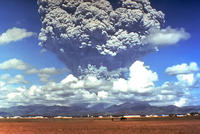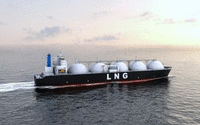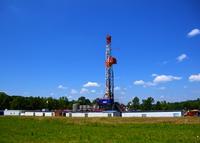-
No-till could help stabilize crop yields despite climate change
Reducing tillage for some Central Great Plains crops could help conserve water and reduce losses caused by climate change, according to studies at the U.S. Department of Agriculture
-
-
Mystery of dramatic leveling off of methane in the atmosphere solved

Increased capture of natural gas from oil fields probably accounts for up to 70 percent of the dramatic leveling off seen in atmospheric methane at the end of the twentieth century; methane has twenty times the global warming potential of carbon dioxide, although CO2 is filling the atmosphere in far larger amounts
-
-
World could be in for higher food prices
This has been one of the driest summers in American history, but the weather is not only affecting the United States; weak monsoons in India and other weather issues across the globe are affecting crops and could lead to higher food prices in 2013
-
-
Geoengineering clouds to slow global warming

Researchers are taking a second look at the possibility of using futuristic ships to shoot salt water high into the sky over the oceans, creating clouds that reflect sunlight and thus counter global warming; The theory behind idea, called “marine cloud brightening,” is that adding particles, in this case sea salt, to the sky over the ocean would form large, long-living clouds
-
-
Bacteria in tap water traced to the water treatment process
Most of the bacteria that remain in drinking water when it gets to the tap can be traced to filters used in the water treatment process, rather than to the aquifers or rivers where they originated; the findings could open the door to more sustainable water treatment processes that use fewer chemicals and, as a result, produce lower levels of byproducts that may pose health risks; eventually, the work could enable engineers to control the types of microbes in drinking water to improve human health
-
-
Greenland melting breaks record four weeks early – with two weeks more to go
Melting over the Greenland ice sheet shattered the seasonal record on 8 August — a full four weeks before the close of the melting season; with more melting yet to come in August, this year’s overall melting will fall way above the old records; researchers devise a “cumulative melting index,” which measures the type of melting which adds to the runoff of melt-water that makes sea levels rise
-
-
Toilet Challenge, 1: Caltech’s solar-powered toilet wins Reinvent Toilet Challenge
The World Health Organization reports that 2.5 billion people around the globe are without access to sanitary toilets, which results in the spread of deadly diseases; every year, 1.5 million people, mostly those under the age of five, die from diarrhea; Caltech scientist awarded grant to develop solar-powered sanitation system
-
-
Toilet Challenge, 2: Loughborough’s hydrocarbonization design wins second Reinvent the Toilet Challenge prize
Researchers from Loughborough University, located in Leicestershire, United Kingdom , won second prize in the Reinvent the Toilet Challenge; their toilet uses a process called Continuous Thermal Hydrocarbonization which kills all pathogens to create safe to handle, valuable material and uses power from heat generated during processing
-
-
Toilet Challenge, 3: U Toronto wins toilet challenge third place for sand filter and UV-ray design
The U of T solution is novel in its simplicity. It uses a sand filter and UV-ray disinfecting chamber to process liquid waste and a smolder chamber, similar to a charcoal barbeque, to incinerate solid waste that has been flattened and dried in a roller/belt assembly
-
-
New earthquake assessment finds increased risk for Washington Dams
Central Washington state has always been considered low risk for earthquakes back when big hydropower dams went up on the Columbia River many decades ago; a recently completed seismic hazard assessment, however, shows that there is a much greater earthquake potential for the area than previously thought; now, dam owners have to figure out whether their dams can hold up to an earthquake; if retrofits are needed, they could cost hundreds of millions of dollars
-
-
U.S. wind power market riding a wave which is likely to crest in 2012
Facing looming policy uncertainty beyond 2012, the United States remained one of the fastest-growing wind power markets in the world in 2011 — second only to China; the expiration of key federal incentives could bring that wave crashing down in 2013, , despite a significant decline in the cost of wind energy
-
-
New system could predict solar flares, give advance warning to help protect power grids

Researchers may have discovered a new method to predict solar flares more than a day before they occur, providing advance warning to help protect satellites, power grids, and astronauts from potentially dangerous radiation
-
-
Close to 1,000 earthquakes shook Arizona in 3-year period: study
Historically, most of Arizona has experienced low levels of recorded seismicity, with infrequent moderate and large earthquakes in the state; comprehensive analyses of seismicity within Arizona have not been previously possible due to a lack of seismic stations in most regions, contributing to the perception that widespread earthquakes in Arizona are rare; a new study debunks this myth
-
-
Future increases in U.S. natural gas exports may not be as large as thought

Amid policy debate over potential liquefied natural gas (LNG) exports from the United States, a new study predicts the long-term volume of exports from the United States will not likely be very large; the paper also argues that the impact on U.S. domestic natural gas prices will not be large if exports are allowed by the U.S government
-
-
Farmers upset by plan for water banking system

Depending on the depth of the drilling, it can take anywhere from two gallons to two million gallons of water to frack one well; drilling companies consumeenough water in their fracking operations to meet the needs of between 66,400 and 118,000 households; in the parched Midwest, farmers raise questions about water-use priorities
-
- All
- Regional
- Water
- Biometrics
- Borders/Immig
- Business
- Cybersecurity
- Detection
- Disasters
- Government
- Infrastructure
- International
- Public health
- Public Safety
- Communication interoperabillity
- Emergency services
- Emergency medical services
- Fire
- First response
- IEDs
- Law Enforcement
- Law Enforcement Technology
- Military technology
- Nonlethal weapons
- Nuclear weapons
- Personal protection equipment
- Police
- Notification /alert systems
- Situational awareness
- Weapons systems
- Sci-Tech
- Sector Reports
- Surveillance
- Transportation
Advertising & Marketing: advertise@newswirepubs.com
Editorial: editor@newswirepubs.com
General: info@newswirepubs.com
2010-2011 © News Wire Publications, LLC News Wire Publications, LLC
220 Old Country Road | Suite 200 | Mineola | New York | 11501
Permissions and Policies
Editorial: editor@newswirepubs.com
General: info@newswirepubs.com
2010-2011 © News Wire Publications, LLC News Wire Publications, LLC
220 Old Country Road | Suite 200 | Mineola | New York | 11501
Permissions and Policies
